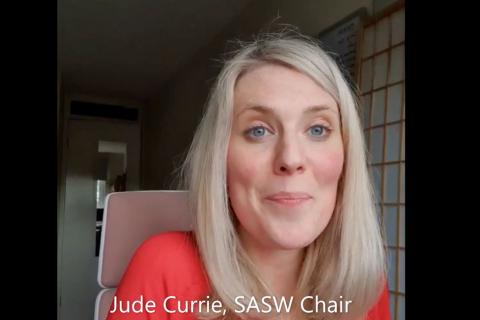Spotlight Session 4: Edinburgh’s Story – the Three Conversations Approach; The Role of Social Work in Recovery Re-mobilisation and Re-design Across Health and Social Care; Reconnect – Community Health through Digital Stealth; Recovery and Resilience through Self-management
Video Galleries
Edinburgh’s Story – the Three Conversations Approach
In working towards delivering an affordable, sustainable and trusted health and social care system for Edinburgh, the Edinburgh Health and Social Care Partnership (EHSCP) has embarked on an exciting and radical new approach to the challenges facing every partnership in Scotland. This has been achieved through the Transformation Programme and, in particular, the Three Conversations (3Cs) approach.
The 3Cs approach is an attempt to move away from traditional approaches to assessment that often lead to long waiting lists and excess paperwork for staff. Instead it uses an asset orientated, strengths-based approach that focuses on capabilities of people, families and communities, and organises resources around having ‘three conversations’ really well. It recognises the power of connecting people to the strengths and assets of community networks, and the necessity to work dynamically with people in crisis.
This will explore how the 3Cs has been chosen for Edinburgh because it underpins and supports their intent, strategic priorities, vision and values. It is based on working differently, to achieve improved outcomes for people and families, working in a more preventative and personal way but without an increase in staff or budget.
Speakers
Nikki Conway
Locality Manager, Edinburgh Health and Social Care Partnership (City of Edinburgh Council)
Jan Stuart
South East Innovation Team Lead / 3Cs Practice Lead, Edinburgh Health and Social Care Partnership (City of Edinburgh Council)
The Role of Social Work in Recovery Re-mobilisation and Re-design Across Health and Social Care
This presentation will take a broad look at the role of social work; how it has changed and developed over the last 50 years and key questions around the future place of the profession within the world of integrated health and social care.
Delegates will hear about the flexible and reflective profession of social work and how this can inspire multi-disciplinary and creative thinking. This presentation will also consider the potential of social work in contributing to recovery, re-mobilisation and re-design through the next stage of the pandemic so that health and social work can collaborate effectively.
Speakers

Alison Bavidge
National Director, Scottish Association of Social Work
Reconnect – Community Health through Digital Stealth
People Know How is a Scottish social innovation charity founded in 2013 on the principle that people know how to identify their needs and the solutions that will help them fulfil their potential and solve social issues.
People Know How have had to adapt their services digitally during the Coronavirus (COVID-19) pandemic, supporting people to reduce social isolation, improve wellbeing and gain digital skills. In doing so they have faced challenges, but the benefits people have gained from devices and digital support are incredible.
This presentation will share the learning from this adaptation process, focusing on how they have continued to support the community with their Reconnect service, a creative response to improve wellbeing for families and adults.
Delegates will hear how they have faced and overcome challenges, resulting in an ability to establish meaningful relationships in this digital space, and using this learning as an opportunity to grow and develop wellbeing support, improving lives across a range of positive indicators.
The findings from their experiences during the pandemic have led People Know How to establish a national campaign to eradicate data poverty in Scotland entitled Connectivity Now. Delegates will hear more about this during the presentation and how they can get involved.
Speakers

Kimberley Alshaikly
Learn Digital Coordinator, People Know How

Claudia Baldacchino
Graphic Designer and Communications & IT Officer, People Know How
Recovery and Resilience through Self-management
Self-management encourages and supports individuals to take greater responsibility for their own health and wellbeing and to live life to its full potential. It is about forging equal partnerships between the individual, health and other professionals and the community around them, to the mutual benefit of all and embedding sustained change in people’s lives.
Individuals need varying methods of self-care, person-centred support and self-responsibility through learning for self-worth and reduction of stigma. Self-management courses can empower individuals to learn and develop strategies focusing on prevention which, through time, enhance mental wellbeing and inclusion.
This presentation will give delegates an overview of a self-management journey in Highland and how they had to adapt during 2020 – the support available, the benefits and the difference is has made to people’s lives. It will provide an overview of the eLearning suite and their aim to become sustainable allowing the learning to be embedded.
Speakers

Sodirakis Kakouris
LGOWIT eLearning Development Officer, LGOWIT (Let’s Get On With It Together)

Joanne McCoy
Manager LGOWIT, LGOWIT (Let’s Get On With It Together)
